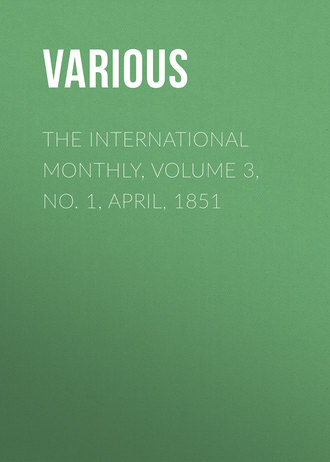 полная версия
полная версияThe International Monthly, Volume 3, No. 1, April, 1851
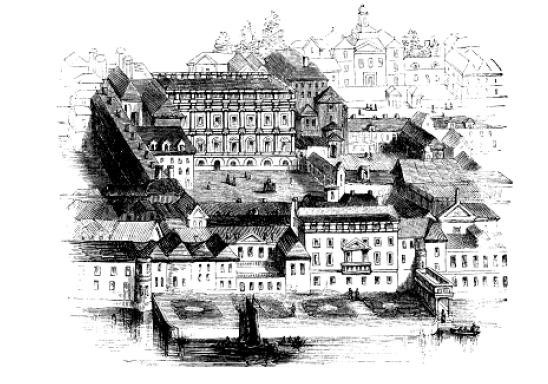
WHITEHALL.
The scene in St. James's Park to which Evelyn refers, was an index to the age5.
Blessed as we are in the knowledge that nowhere in England are the domestic virtues better cultivated or more truly flourishing than in our own pure and high-souled court, we are almost inclined to treat as a mythological fable, the history of Whitehall during the reign of Charles the Second. No one trait of the father's better nature redeems that of the son. His life was indeed
"a sad epicure's dream,"and worse. He was not worthy even of the earnest devotion which the poor orange-girl, of all his favorites, alone manifested to the last.
Poor Nell! the sympathy which every right-thinking woman feels it a Christian duty to give to her and her class, far from extenuating vice, is only a call upon the virtuous to be more virtuous, and to the pure to be more pure. No one would plunge into crime, merely for the sake of being redeemed therefrom; no one take the sin, who looked first at the shame, hideous and enduring as it must be—however overshadowed by the broad wings of mercy; the burn of the brand can never be effaced, however skilfully healed. And when the wit, the loveliness, the generosity, the fidelity of "Madame Ellen," when the memory of the well-spent evening of her checkered life, and the allowance we make for the early impressions of a young creature, called upon to sing her first songs in a tavern, and sell oranges in the depraved and depraving saloon of "the King's House;"—when all these aids are exerted to excite our sympathy, we only accord the sentiment of pity to "poor Nell Gwynne!"
While looking at the house said to have been inhabited by this "femme d'esprit par la grace de Dieu!" we vowed a pilgrimage to Sandford Manor House, at Sandy End, Fulham,—to the dwelling where there is no doubt she spent many summer months. Near as it is to our own, we were doubtful of the way, and determined to inquire of our opposite neighbor, who keeps the old Brompton tollbar.
"Sandford Manor House," repeated he, "I never heard tell of such a place in these parts. Whereabouts is it?"
"Exactly what we want to know. It is a very old dilapidated house, by the side of a little stream that runs into the Thames somewhere by Old Chelsea. I think you must have heard of it. It was once inhabited by the famous Nell Gwynne." I might almost as well have talked Hebrew to our neighbor, who seemed born to lay in wait for market-carts, and pounce upon them for toll.
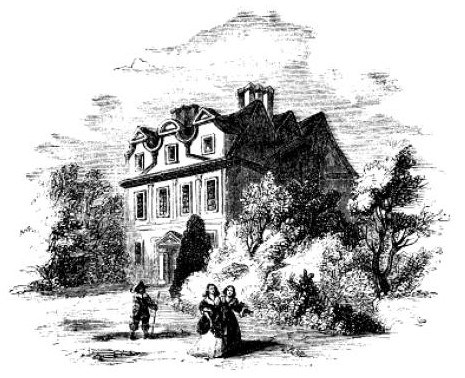
SANDFORD MANOR HOUSE.
"Old house! Nell Gwynne!" he again repeated, and something like an expression of life and interest moved his features while he added—"It's the Nell Gwynne public-house you're after, I'm thinking; that was in Chelsea; but whether it's there now or not, is more than I can tell."
"No, no," we answered, perhaps, sharply, "it is the house she lived in we want to see—Sandford Manor House."
"Perhaps it's the madhouse," he suggested. We walked on. "Please," said a little rosy-faced boy, "if you want to find out any thing about old houses, Hill, the rat-catcher, knows them all, as he hunts up the rats and sparrows about; and you have only to go down Thistle Grove, into the Fulham road—straight on. His is a low house, ma'am—his name in the window—you can't pass it, for the birds and white mice."
And is there no one left, we thought, to tell where the witty, light-hearted, true-hearted Nelly lived—she who was the friend of Dryden and Lee, the favorite of Lord Buckhurst, the rival of the Duchess of Cleveland, the protector of the soldiers of England—the one unselfish friend of the selfish Charles? Is there no one in a district that once echoed with the praise of her charities—no one to tell where she resided, but Hill, the old rat-catcher? We proceeded through the prettily-built, but gangrened-looking, cottages located in Thistle Grove, once called Brompton Heath, (or Marsh, we forget which,) until the sounds of traffic reminded us that we were in the Fulham road. Presently the sharp voice of a starling, just above us, attracted our attention.
"Poor Tom!" said the bird—"Tom!—poor Tom!"
The old rat-catcher invited us to enter. He is a man of powerful frame, with a massive head, fringed round with an abundance of gray hair, with deep well-set eyes, and a quiet smile. Two sharp, bitter-looking, wiry-haired terriers began smelling, casting their sly eyes upwards, to see if we feared them or were friendly to their advances, and, after a moment or two, seemed sufficiently satisfied with the scrutiny to warrant their wagging their short stumpy tails in rude welcome. The room was hung round with cages of the songbirds of England—some content with their captivity, others restless, and passing to and fro in front of the wires, eager for escape. Strong inclosures, containing both rats and ferrets, were ranged along the sides of the small room; the latter, long, yellow, pink-eyed, and pink-nosed creatures, lithe as a willow wand, courting notice; while the rats, on the contrary, moved their whiskers in defiance, and, with bright, black, determined eyes, sat lumped up in the distant corners of their dens, ready 'to die game,' if die they must. Gay-colored finches, the gold and the green, graced the window in little brown bob cages; while mice of all colors, from the burnt sienna-colored dormouse, who was more than half asleep within the skin of an apple which it had scooped out, to the matronly white mouse, who was sitting composedly amid a progeny of thirteen young ones, attracted groups of little gazers, every now and then dispersed by the larger terrier, who ran out amongst them, snarling and threatening, but doing them no harm. "Come in, old chap; that will do, old fellow," said his master, adding, "I would not keep a dog that would hurt any thing but a varmint."
"Oh, oh! Nell's old house," he replied to our inquiries; "Nell Gwynne's house at Sandy End, where runs the little river they deepened into a canal—the stream I mean that divides Chelsea from Fulham—Sandford Manor House! Ay, that I do, and I'd match it against any house in the county for rats!—terrible place—I lost two ferrets there, this time two years, and one of them was found t'other side of the canal; it must have been a pleasant place in those days, when the king was making his private road through the Chelsea fields, and the stream was as clear as a thrush's eye, and birds of all sorts were so tamed by Madame Ellen, that they'd come when she'd call them. Ah, a pretty woman might catch a king, but it's only a kind one that could tame the wild birds of the air; I know that; I'll show you the way with pleasure." "Poor Tom," sung out the starling. "Your bird is calling you," we observed, after he had told his wife not to let the jay pick "the splints" off his broken leg, and we were leaving the door. "It's not me he's calling," answered the old man, with a heavy sigh. "Now that's a bit of nature, ma'am. A bird, I'm thinking, remembers longer than a Christian does. Poor Tom's wife is married again, but the starling still calls for its master. It's hard to say, what they do or do not know; the bird often wrings my heart; but for all that, I could not part with him." At any other time we would have asked him the reason, but just then we were thinking more of Nell Gwynne than of our guide. We walked on, until we came to the "World's End." "It is nothing but a common public-house now," observed our companion, who had not spoken again, except to his dog: "but I remember when it was more than that; and, moreover, in Nell's time, it was a place of great resort for noblemen and fine ladies—a royal tea-garden, they say—filled with the best of good company; they liked the country and the open air in those days." We continued silent, until at last our guide called "Stop!" so suddenly, as to make us start. "Do you see that bank just under the arch of the bridge we stand on? The hardest day's work I ever had was digging an old rat out of that bank. This is Sandy End; and that house opposite is Sandford Manor House6."
There was nothing in the sight of those green, grim walls to excite any feeling of romance. Yet positively our heart beat more rapidly than usual for a minute or two—"a way it has" when we are at all interested. We turned down a lane seamed with ruts, by the side of a paling black with gas tar. We passed two or three exceedingly old houses, and one in particular with three windows in front. It was evident that the paling had been run across the garden, which must have been very extensive. After waiting a few minutes for permission from the master of the gas-works, to whom the Manor House belonged, to enter, an elderly man of respectable appearance opened the gate, and told us he resided there, and that the servant would show us all over the house. The rat-catcher commenced poking his stick into the various mounds of earth wherever there was the appearance of a hole, and his dogs became at once busy and animated. There was but one of the three walnut trees said to have been planted by royal hands, remaining, and that stood gnarled, and thick, and stunted, close to the present entrance—bent it was, like a thing whose pleasantest days are gone, and which cares not how soon it may be gathered into the garner. A circular plot of thick green grass was directly opposite the hall door, and in its centre grew a young golden holly, some of the turf being cleared away from round its root. This was encircled by a fair gravel walk, leading to the house, which was entered through a rustic porch, covered with ivy; very old and rampant it was, and its deep heavy foliage, so densely green, had a pall-like look, as it rustled and sighed in the sharp keen air. It was flanked by two cypress trees, well-shaped and well-grown. Dank ivy and deep cypress where the living Nell would have twined roses and passion-flowers! You see the old door-way when under the porch; it is of no particular order, but massive and pointed,—the hall is like the usual entrance to old-fashioned country-houses, panelled with oak. The staircase is very remarkable, as Mr. Fairholt's sketch will show; broad twisted iron rods, of great thickness, springing from the oak square pillars which flank the turnings, and assisting to support the flight above. The room on the right is large, the ceiling low, the windows deep set in the thick walls. A very gentle looking little maid was nursing a pretty white cat by the fire; her young fresh face and bright smile were like sunbeams in a tomb; what did she there? We could fancy old withered crones in such a dwelling, rather than a fair tender child, and yet she looked so happy, and so full of joy! The opposite room had been fitted up as a kitchen, and was clean and cold. We paced up the stairs so often trodden by Nell's small feet, when they descended briskly to meet the lounging heavy footfalls of her royal master, whom she loved for himself, and careless of her own future, as she was of her own person, cared more for the honor of the indolent Charles, than ever he cared for his own! In nature, in feeling, in all honors save the one, how superior was the poor orange-girl to her rivals; they envied and slandered each other, disdaining no article to fix the fancy of the king, who desired nothing more than that they should all live peaceably together, and was not able to comprehend why they did not agree when he endeavored to please them; they copied each other—but Nell resembled only herself. Instead of going like the generality of her sex from bad to worse, the more her opportunities of evil increased, the better she became. The ladies of the court swore, drank, and gambled; it was the fashion to be coarse and vicious, and the more coarse they were, the better they pleased the English Sultan; and if the poor orange-girl endeavored to keep her lover by what bound him to others,—where's the wonder? Her manners had their full taste of the time; but we look in vain elsewhere for the generous bravery, the kind thoughts, the disinterested acts, which have retained her in our memories. "Poor Nell!" we said aloud, "poor, poor Nell!" "Please, if you will only go on, I will show you her bed-room and dressing-room, them's little more than closets; but this was her bed-room, and that, the madam's dressing-room," said the servant, a little impatient of delay. Both rooms were furnished, but cold and gloomy; the floor of what the girl called her dressing-room was chippy and worm-eaten. "And there," persisted the servant, "in that corner just by, if not in that little cupboard, the money was found." "What money?" "The money the madam, or some one about her, forgot, fifteen thousand good pounds, I am told; and a gentleman came here once, who told me he had some of the coins that were discovered there." "That must be a mistake," we said. "Oh, there's no knowing. Why should the gentleman tell a story?" We saw the girl was determined we should believe her, contrary both to our knowledge and reason, so we made no further observation, while she muttered that she would "just go and put her own room straight a bit." We were left alone in Nell's dressing-chamber! She never bestowed much time upon her toilet; and Burnet, who was particularly hard upon her at all times, says that, after her "elevation," she continued "to hang on her clothes with the same slovenly negligence;" and, truly, Sir Peter Lely, would make it appear that all the "ladies" of the court, however rich the materials that composed their dresses, and well assorted the colors, "hung" them full carelessly over their persons; nay, it would be difficult to imagine how they could stand up without their dresses falling off; they certainly have a most uncomfortable look7. However she dressed, she certainly succeeded in winning, and even keeping, the fancy (for we may doubt if he had any affection for the ministers of his vices) of Charles until the end. And although Burnet was marvellously angry that at such a time the thought of such a "creature" should find its way into the mind when it was about to lay aside the draperies of royalty for the realities of eternity—yet the only little passage in the life of the voluptuary that ever touched us was, his entreaty to his brother James, "Not to let poor Nelly starve!" We closed our eyes in reverie, and endeavored to picture the "beauties" upon whom the licentious king conferred a shameful immortality. Unfortunately the most powerful female influence in the Cabinet has generally been exercised by worthless women; an argument, if one were needed, to prove that a woman is little tempted to interfere with State affairs if her mind is untainted, and directed to the source of woman's legitimate power.
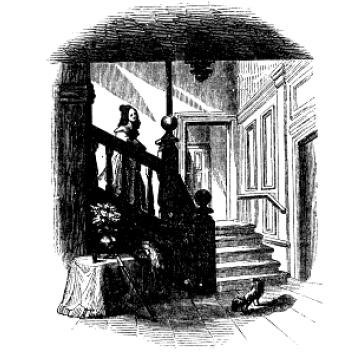
STAIRCASE, SANDFORD MANOR HOUSE.
How loathsome was the King's subjection to the abandoned vixen, my Lady Castlemaine! And yet how powerful must have been her beauty! Can we not, in fancy, see her now,—stepping out of her carriage at Bartholomew Fair, whither she had gone to view the rare puppet-show of "Patient Grizzle," hissed when recognized by the honest mob; yet upon turning the light of her radiant and beautiful face towards them, they exchange their jibes and curses for admiration and hurras.
"Poor Nelly" was no proficient in pen-craft, for she could only sign with the initials—E. G.
Until the publication of Mrs. Jameson's "Beauties," there existed a popular fallacy, that every one of Sir Peter Lely's portraits, represented a woman of tainted reputation; this was any thing but true; however poisonous a malaria may be, there are always some who escape its influence, and the pure and high-souled Lady Ossory, and the noble Countess de Grammont would adorn even a court such as our own; we wish that Evelyn or Pepys had recorded how those ladies treated "Nell," for they must have met her during their attendance on the outraged Queen, and hardly less insulted Duchess of York; they must have encountered her at Whitehall, and noted her dimpled cheeks, and small bright laughing eyes; and contrasted her unaffected child-like bearing, with the boisterous arrogance of the Duchess of Cleveland, and the cat-like cunning of the French courtezan, (the Duchess of Portsmouth,) who could not with all her arts detach the sovereign from poor Nell, whose genuine wit, generosity of mind, as well as purer life, and careless buoyant humor, were reliefs to the caprices and eternal French cabals,—which troubled his unenergetic nature, in the gorgeous salon of the most extravagant of his favorites. From such women as Madame de Grammont and Lady Ossory the untitled actress could have met no offence; for women of high virtue are merciful; women who affect it, are not.
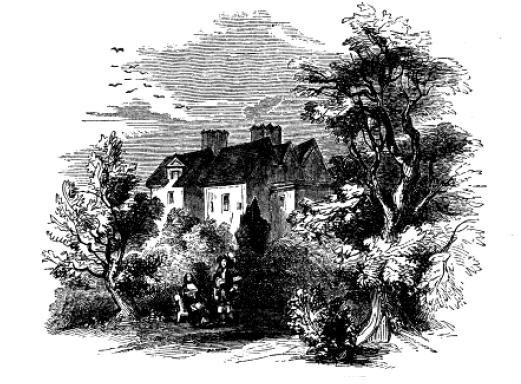
Another View of the Manor House.
We could fancy Nell's silver laugh, passing along those damp walls of Sandford Manor House; we could imagine her leaning from that window, conversing with, and rallying, her royal "lover," who stands beneath, amid the flowers, once so bright and abundant, where only weeds and stinging thistles were to be seen this winter-time. As for him, wisdom came not with years; "consideration" never whipped the offending Adam out of him—in his character there was no "nettle," but there was no "strawberry." What does he reply to her merrie rallying as she dallies with her looking-glass? He leans his white and jewelled hand upon his hip, and, with a faded smile, listens to her mingled love and reproof. She talks of the old soldiers, and wonders why the builders pause in the erection of the Hospital, for lack of cash, when certain ladies sport new diamonds, and glitter in fair coaches; and he tells her he will take her, if she likes, from where she is, and give her the palace by the water-side, in exchange for her sweet words and sweeter smiles. She will none of this, but answers she would rather content her in the humblest house in his dominions, so that the soldiers who fought his battles should be worthily lodged in their old age. He repeats to her the last bit of Sedley, and diverts her with news of a new play, for well he knows those who once lived by the buskin love the buskin still:8 and she listens, and is pleased, but returns to her first theme; and, provoked at last by an indifference she cannot understand, she becomes bitter, and then Charles laughs at "little pig-eyed Nelly." "Ah, Nell, Nell!" he says, stroking, at the same time, the fair tresses that grace the head of a pretty boy, her son, "you are like the fruit that will come of yonder trees, a rough and bitter outside, but a sweet and pleasant soul within."
We composed our thoughts, or rather we aroused from those waking dreams in which all indulge sometimes—more or less. The house contains fourteen rooms—and must have been pleasant, long ago, as a retreat where poor Nell could bring her titled children—whom she doubtless loved with all the enthusiasm of her ardent nature. We crossed the garden, but could find no trace of the pond in which tradition reports Madam Ellen's mother to have been drowned. Not long ago, a very old woman resided in Chelsea, whose grandmother, it was said, was Nell's stage-dresser; this was before old Ranelagh was built over, and when the site of Eaton Square was intersected by damp pathways and nursery-gardens. We entered the meadows at the back, to see how the house looked from thence, which greatly delighted the rat-catcher's terriers.
Modern "improvement" long spared this locality. When we knew and loved it first, we could see the Thames from our windows in one direction, and Kensington Gardens in another. But old houses, standing within their own park-like inclosures, and old trees and green fields, are nearly all gone.9 We used to have the nightingales in the elm-avenue leading to Hereford Lodge, but the only nightingale we had last spring was one who came from the far north. Many hereafter will do pilgrimage to her shrine with a far deeper feeling of respect, than, with all our charity, we can bestow upon Sandford Manor House.
If the women of England could forget this period of our history, which, as Mrs. Jameson truly and beautifully observes, "saw them degraded from objects of adoration to servants of pleasure, and gave the first blow to that chivalrous feeling with which their sex had hitherto been regarded, by levelling the distinction between the unblemished matron and her 'who was the ready spoil of opportunity'"—if this were possible, it might be well, like Claire, when she threw the pall over the perishing features of Julie, to exclaim—
"Maudite soit l'indigne main qui jamais soulevera ce voile,"but so it is not; and it becomes our duty to look on Charles, and those who were corrupted by his example and his influence, as plague-spots upon the fair brow of our beloved country. We should learn to speak of him, not as distinguished for "gallantry," but as the monarch who reduced those he insulted by his love below the level of the poor Georgian slave, who knows no higher destiny than to glitter for a few short moons as the star of the harem. But if some of the women of that court were deeply degraded—if the termagant and imperious Castlemaine; the lovely and intriguing Denham; the coquettish, cold, and cunning Richmond; the innately-dissipated and unrestrainable Southesk; the equivocal Middleton; the rapacious, prodigal, and insinuating Querouaille,—are rendered infamous in our national history—let us not confound the innocent with the guilty. We can point out to our daughters, for admiration and example, the patient, affectionate, and enduring Lady Northumberland, the beloved sister of Lady Rachel Russel; the beautiful Miss Hamilton; the peerless Lady Ossory; the matchless Jennings;—women passing through the ordeal of the Whitehall court, at such a time, with unstained repute, may be well believed to have possessed innate virtue and true feminine dignity.
We have not classed Nell Gwynne among the court profligates; nor can we so describe her. She was most unfortunate, but not innately vicious; we may say so without danger to others. Neither the circumstances of her life or death hold out temptations to follow her example. She endured vexation and contumely enough, during the most brilliant period of her life, to embitter even a less sensitive spirit than hers. The deep and earnest love she bore the worthless king, must have been a sore scourge to her own heart. The very piety of her nature, overcome as it was by circumstances, and the lack of those virtues which, slow of growth, only attained strength during the last seven years of her life, and were not deemed unworthy the Christian forbearance and even commendation of Doctor Tennison,10 whose funeral sermon preached in memory of the poor orange-girl, proves that she must have suffered much from the reproofs of conscience, even when her sin to all appearance most revelled in its "glory." The canker eat into the rose—soiled and marred its perfectness—chipped and wasted its beauty—but could not destroy its perfume!
That there must have been great good, and great fascination, in Nell Gwynne, is proved by the kind of memory in which her name is enshrined. While we say "Poor Nell!" we shake our heads—the sigh and the smile mingle together—we regret and pity her. We wonder she was so good—we sorrow at the impurity,—not so much of the beset actress, as of her position. We know that, though fallen, she was not depraved. She was not avaricious, nor intriguing, nor ill-tempered, nor unjust. Her regard for literature (though she could hardly sign her own name) proved the up-looking of her better nature; and her charity was unbounded. Shall we—reared and instructed in all righteous ways—shall we show less charity to the memory of one who in her latter days rose out of the slough into which circumstance—not vice—had plunged her? Shall we be less charitable than the bishop who honored her memory and his own character by recording her benevolence, her penitence, her exemplary end? The good bishop's testimony renders it needless that we "point a moral." There was "joy in heaven" over one sinner that repented. Who but One can judge the heart? Let charity hold up her warning finger, often, when we "think evil:" and consideration, "like an angel" come, when harsh judgment dooms an "erring sister." Above all, let us adopt the sentiment of the poet (and our pilgrimage to Sandford Manor House will not be in vain):









